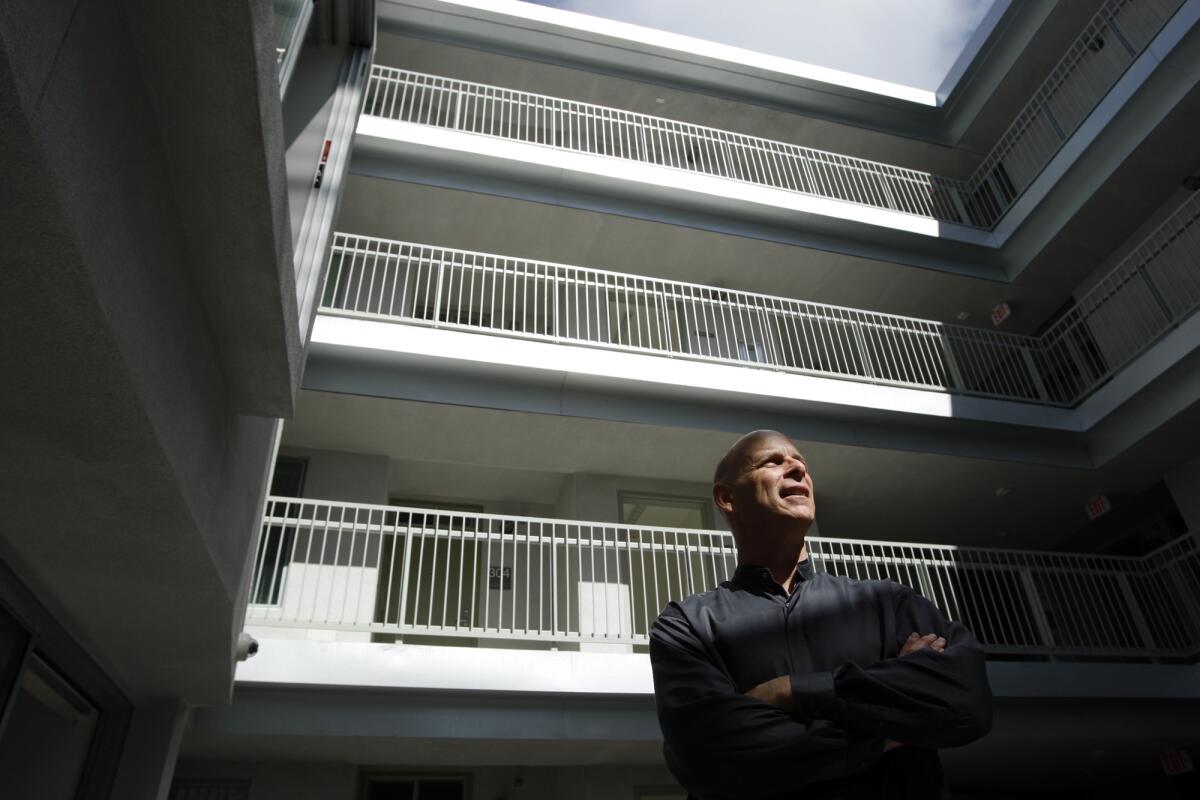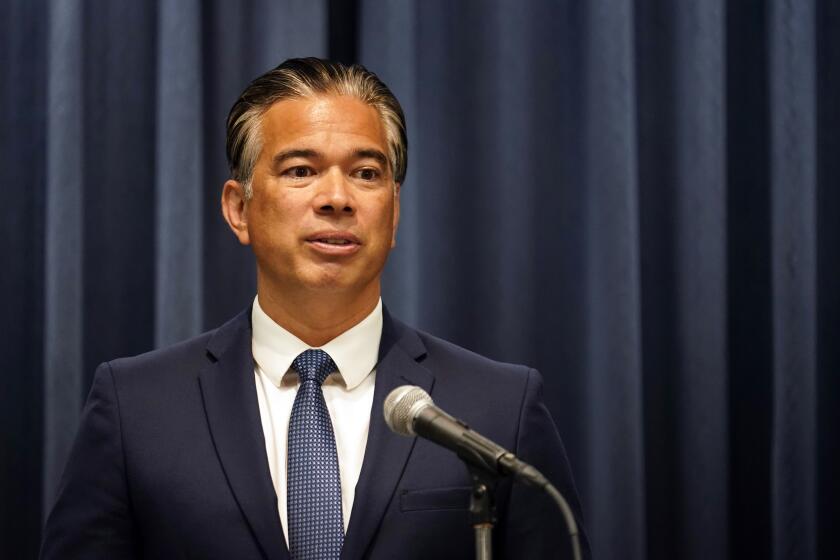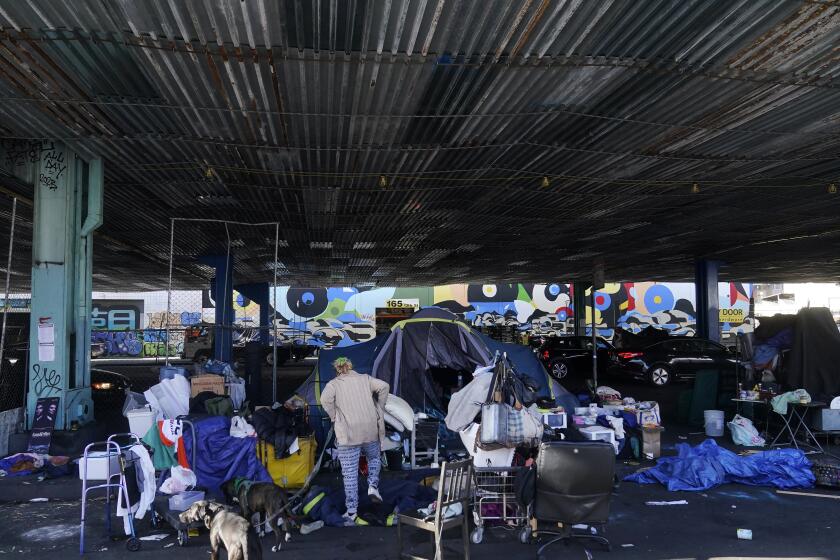$2.7 million meant to build homeless housing ended up with L.A. nonprofit, court records say

- Share via
When Gov. Gavin Newsom launched his $3.4-billion Project Homekey homeless housing program, L.A.-based real estate developer Shangri-La Industries and the Santa Monica nonprofit Step Up on Second Street were among the top recipients of its largesse.
The organizations were awarded more than $114 million in Homekey funds to convert seven motels in San Bernardino, Ventura and Monterey counties into studio apartments for formerly homeless tenants.
But instead of creating hundreds of housing units for some of California’s neediest individuals, the projects became mired in financial disarray. Today most sit empty and unfinished. All seven have been foreclosed on. So far Shangri-La, as the partner that handled all the financing, has been the main target of a civil lawsuit by state Atty. Gen. Rob Bonta and media reports about the situation.
But recently filed court documents suggest that Step Up — one of L.A. County’s best-known homeless housing and service providers — had an economic interest in the Homekey projects not previously made public, and could face financial fallout.
Step Up President and Chief Executive Tod Lipka has said his organization is cooperating fully with Bonta’s office and was only a service provider in the projects, with no part in handling Homekey funds, acquisition or financing.
New court documents suggest a more complicated relationship, with Step Up invested alongside Shangri-La in the projects’ potential long-term profits; and that in late 2022 Step Up sold that interest to Shangri-La for $2.7 million. In Bankruptcy Court filings, Shangri-La’s lawyers claim that money was meant to go toward construction on a Homekey project in Salinas that’s still empty. Instead, said Brian A. Sun, an attorney working with Shangri-La, the money went to Step Up because it needed cash and asked Shangri-La to buy out its profit interest.
“They came to us when they were in distress and we helped them out, and now we’re paying the price,” Sun said. “Having that extra $2.7 million would’ve been real handy when these lenders were coming around asking for payment.”
Now, with Shangri-La pursuing a bankruptcy, Step Up could face efforts by creditors to claw back those funds.
Lipka says he’d believed the payments came from Shangri-La’s “existing funds,” not funds intended for construction, and would not have approved the transaction if Step Up knew they were Homekey funds.
“We are only beginning to discover the extent of the alleged fraud and deception committed by Shangri-La,” Lipka wrote in an email to The Times, echoing claims made by Bonta.
A contractor with the state’s Project Homekey homeless housing program is accused of improperly borrowing money against seven projects, many of which are in danger of foreclosure.
In January, Bonta filed a civil lawsuit against Shangri-La in L.A. County Superior Court on behalf of the California Department of Housing and Community Development, accusing the company of fraud and breach of contract and demanding it return the Homekey funds. Its partners, including Step Up, lenders and cities and one county where the projects were planned, were listed as co-defendants.
Last month, a state audit found that California hasn’t adequately tracked the outcomes of $24 billion it’s spent on programs to fight homelessness, including Homekey, over the last five years. The seven housing projects by Shangri-La and Step Up offer one example of how difficult it can be to balance urgency and oversight. Shangri-La received its Homekey grants directly, upfront, according to the Department of Housing and Community Development. “This was the program structure, to disburse upfront in order to quickly acquire the projects,” said a spokesperson for the department. What exactly happened to the more than $114 million that Shangri-La received is unclear, but court proceedings, including the recent filings involving Step Up, have begun to reveal some possible answers.
Shangri-La’s website describes the company as a “fully integrated, privately held, commercial real estate firm” engaged in “investment, development, design, construction, and management services, all under one roof.” It’s an offshoot of Shangri-La Entertainment, an organization started by the late philanthropist and film producer Stephen Bing.
Step Up, founded in 1984, provides mental health services and housing to formerly homeless individuals across Los Angeles. In 2023 the organization served more than 5,000 individuals, according to Lipka.
Prior to their Homekey collaboration, Step Up and Shangri-La worked together on other affordable housing projects, including four in Los Angeles using funds from the city’s $1.2-billion Proposition HHH homeless housing bond. Generally, Shangri-La handled acquisition, financing and construction, Lipka said, while Step Up provided tenant services and property management at the completed buildings.
“We fully expected them to perform” on the Homekey deals, Lipka said of Shangri-La, “because they had a history of performing.”
The California State Auditor’s Office analyzed homelessness spending at the behest of lawmakers concerned about efficacy.
The Homekey projects’ failures started with several short-term loans that Shangri-La took out against the properties to augment the Homekey awards. Ultimately Shangri-La defaulted on payments, sending the projects into receivership and, eventually, foreclosure.
Lipka said he learned something was amiss only in late 2023, when he received default notices for some of the loans. “When we asked Shangri-La, they provided assurances — like they did with many of the other entities in these deals, the cities as well as the state — that they’re going to take care of it, they’re going to fix it, they’re going to take care of everything,” Lipka said.
Only three of the seven buildings have opened to tenants, including one in Salinas that’s partly occupied and operating as a shelter, with clients staying in unrenovated rooms, according to court documents; another, empty project in Salinas has fallen into severe disrepair and at one point became a home to squatters, according to a report by one of the court-appointed receivers.
Shangri-La and its owner, Andrew Meyers Abdul-Wahab, blame the company’s former chief financial officer, Cody Holmes, for sending Shangri-La into financial ruin. In February, Shangri-La lawyers sued Holmes in L.A. County Superior Court, seeking more than $40 million in damages.
The complaint accuses Holmes of stealing money meant for affordable housing and spending it on personal expenses — including a $46,000-a-month rental home in Beverly Hills, Louis Vuitton and Chanel handbags and a $5,000 monthly lease for a Ferrari Portofino — and taking out loans against Shangri-La properties to cover up his alleged embezzlement. (Holmes’ attorney has yet to respond in court, and did not respond to requests for comment from The Times.)
In a more recent court document filed as part of a rejected bankruptcy attempt for one of the Homekey projects, Shangri-La attorneys said that in late 2022 the company also gave $2.7 million in loan proceeds meant for housing construction to Step Up, in exchange for Step Up’s stake in future profits from the Homekey projects.
Between November 2022 and January 2023, according to the motion filed in U.S. Bankruptcy Court, Shangri-La paid Step Up two out of three scheduled buyout payments (the full amount was supposed to be about $3.6 million) for its “profit participation interests and developer fees,” using “loan proceeds which should have been used for its development project.”
According to the agreements between Shangri-La and Step Up, obtained by The Times, Step Up stood to earn 15% to 25% of potential future profits on the projects, as well as $3,000 per unit in “pre-development” fees on some of the buildings upon closing.
Other nonprofit executives involved in affordable housing construction say that $3.6 million is an unusually large amount to pay for a portion of the prospective returns on income-restricted buildings, which typically take years or decades to turn a profit, if at all. The buyouts in 2022 and 2023 were partly based on per-unit fees for Step Up ranging from $1,500 to $13,000, according to Bankruptcy Court documents.
After the court filing, Lipka said in an email to The Times that he had no idea the payments came from money earmarked for housing. In response to a question about how the two companies came up with a value for Step Up’s profit interests, Lipka said it was based on “an aggregate present value” and referred further questions to his attorneys.
To date, court records have raised more questions than they’ve answered about exactly how the Homekey funds for the seven mostly vacant projects were used. In a declaration filed in federal Bankruptcy Court in May, Edwin W. Leslie, the receiver appointed for four projects in Monterey County, said Shangri-La hasn’t given him financial records. “I was not provided a single bank statement, a single accounting of how the millions of dollars of public funds were used, a single construction budget, a single contract with a contractor or sub-contractor, a single tax return, or a single piece of correspondence,” Leslie said.
In a report filed in Monterey County Superior Court in late February, Leslie said Step Up hasn’t cooperated with him either.
“The Receiver has not been successful in obtaining necessary financial reports or verification of funds from Step-Up On Second Street, Inc.,” he wrote. “Based on information received to date from third party sources, Step-up may have received in excess of $20 million in funds from state, city and county agencies related to these properties and operation of same.”
Eventually, Leslie issued subpoenas to the nonprofit to obtain records and documents, his lawyer confirmed.
“I have no idea where he got that number from,” Lipka said of the $20 million. “We’ve complied with all requests for information, both formally and informally, from both Edwin Leslie and the office of the attorney general. And we often don’t have the items that they request.”
Shangri-La, he said, received the Homekey money and should have all the related financial records.
“We won’t handle Shangri-La’s responsibilities.”
More to Read
Sign up for Essential California
The most important California stories and recommendations in your inbox every morning.
You may occasionally receive promotional content from the Los Angeles Times.













